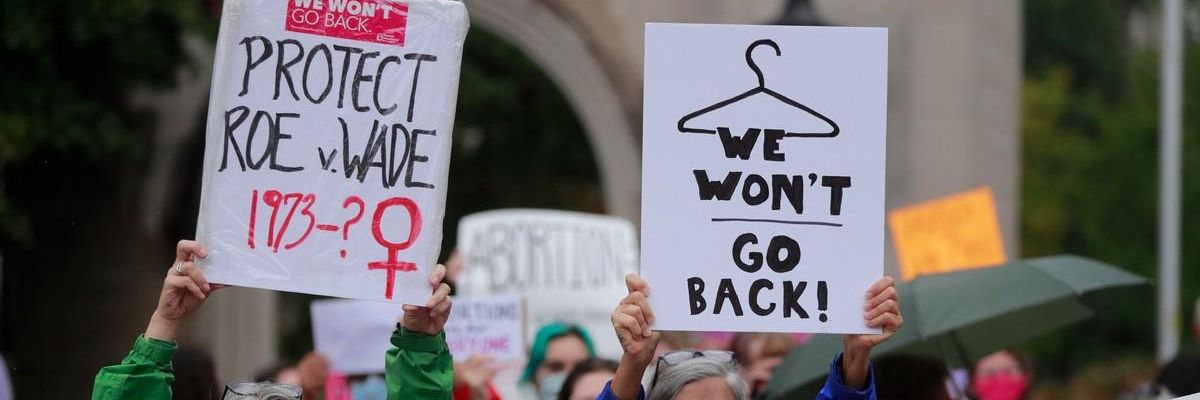What do anti-union "right-to-work" laws, public disinvestment, over-incarceration, and abortion bans have in common?
According to an Economic Policy Institute (EPI) report published Wednesday, these right-wing policies are all part and parcel of the U.S. ruling elite's deadly war on the working class.
The assault on reproductive healthcare access—which escalated after the U.S. Supreme Court's reactionary majority overturned Roe v. Wade last summer—has been strongest in the same states where the decadeslong attack on organized labor and public goods has been most pronounced, EPI notes.
Although the report doesn't pin the blame for roughly 50 years of wage repression on one party, the data makes clear that Republican-led state legislatures are the vanguard of a multipronged and ongoing effort to intensify the exploitation of workers by weakening unions, social services, and abortion rights. Not all Democrats have fought consistently against union-busting, austerity, and carceral state expansion, but the overwhelming majority are opposed to forced pregnancy, and many support collective bargaining and social programs. GOP lawmakers are alone in enacting so-called "right-to-work" laws in 27 states and life-threatening abortion restrictions in 26 states, though Democratic Louisiana Gov. John Bel Edwards signed his state's abortion ban into law.
"The loss of abortion rights means the loss of economic security, independence, and mobility for millions of people."
“Abortion has long been framed as a cultural, religious, or personal issue rather than a material 'bread and butter' economic concern," EPI analyst and report author Asha Banerjee said in a statement. "In reality, abortion rights and economic progress are fundamentally intertwined, and the loss of abortion rights means the loss of economic security, independence, and mobility for millions of people."
According to the report, "The states banning abortion rights have, over decades, intentionally constructed an economic policy architecture defined by weak labor standards, underfunded and purposefully dysfunctional public services, and high levels of incarceration."
"Abortion restrictions," the report continues, "constitute an additional piece in a sustained project of economic subjugation and disempowerment."
Based on her analysis of state-level abortion access and five indicators of economic security—minimum wage, unionization rates, unemployment insurance, Medicaid expansion, and incarceration rates—Banerjee found that "generally, the states enacting abortion bans are the same ones that are economically disempowering workers through other channels."
According to the report, the 26 states with restrictive abortion laws have on average:
- lower minimum wages ($8.17 compared with $11.92 in the abortion-protected states);
- unionization levels half as high as those in the abortion-protected states;
- only three in 10 unemployed people receiving unemployment insurance (compared with 42% in other states);
- lower rates of Medicaid expansion; and
- an incarceration rate 1.5 times that of the abortion-protected states.
EPI shared visualizations of these key findings on social media:
Banerjee is not alone in pointing out that there is a "direct" and "critical" connection between reproductive rights and economic well-being.
"The consistent pattern of state abortion bans and negative economic outcomes shows how abortion fits into an economics and politics of control," she writes. "Abortion restrictions are planks in a policy regime of disempowerment and control over workers' autonomy and livelihoods, just like deliberately low wage standards, underfunded social services, or restricted collective bargaining power."
Citing a wide range of social science literature, Banerjee notes that there are several "negative economic consequences of abortion denial, from prolonged financial distress to being trapped in lower-paying occupations."
"While the effect of abortion denial is overwhelmingly negative economically, mentally, and physically, there is also strong evidence for the flip side of this argument: that access to abortion is associated with positive economic outcomes," she adds.
"It is crucial for policymakers to recognize that abortion is an economic issue with economic consequences and restore abortion access nationwide immediately," Banerjee argues. "Further, policymakers must work to dismantle the package of additional economic policies that have economically hurt workers for generations."
"States that have banned or restricted abortion access are also those that have designed economic policies to make it increasingly difficult for working people to support themselves," Banerjee concludes. "Alongside supporting protections for abortion access, policymakers at the federal, state, and local levels should prioritize legislation that will improve economic security, including strengthening collective bargaining, boosting wages, funding paid leave, and expanding and improving equitable access to social safety net programs like unemployment insurance and food and nutrition assistance."
